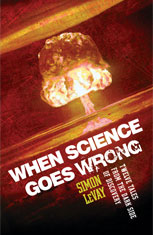

Twelve Tales From The Dark Side Of Discovery
– Simon LeVay
price: £7.99 (+ free postage & packing in the
UK - overseas buyers please contact us first)
this book is available for immediate dispatch
Published April, 2009 – Paperback
ISBN: 978-1-906308-08-7
Buy this as an eBook
NOTE: Kindle software needed – you will be directed to a free Kindle download for PC and Apple Mac
Download a free extract from this book
Click above to download a 34 page extract.
NOTE: Adobe Reader is required to view this PDF file
Book Description
Science is the world’s new religion – but what happens when it goes terribly wrong?
An innocent young black man is convicted of rape and sent to prison for 25 years on the basis of ‘infallible’ DNA evidence… which turns out to be completely bogus.
A long-distance runner’s Parkinson’s Disease is treated with revolutionary neuroscience techniques… which leave a foetus growing in his brain.
A study into why children stutter ends up ruining their lives when scientists deliberately introduce speech impediments… and, to their horror, find they are permanent.
British neuroscientist Simon LeVay explains how elementary mistakes, miscalculations and simple bad science sometimes lead to death (when anthrax spores escape from a lab, or a nuclear plant explodes) and other times to expensive farce (when a tiny data error sends a space probe hurtling to oblivion, or when an 'impossible' hurricane wreaks havoc across the UK).
Baboons on ecstasy, death-by-volcano and the failure of gene therapy to perform as advertised also feature in this authoritative and entertaining study of the limitations of science.

Reviews
'The book might more accurately have been called When Scientists Go Wrong since much of the pleasure in each of LeVay's expertly narrated chapters (the author is himself a neuroscientist) is in watching science go right, as subsequent empirical investigations throw light on what went wrong in the first place.
LeVay interviews as many of the surviving protagonists as possible: some are regretful, others defiant, and many curiously misremember key facts (he has a beautifully understated way of pointing this out). The soberly argued upshot is that disasters will inevitably happen: "There may be an irreducible core of risk in science that cannot be eliminated without eliminating science's rewards." Throughout, he displays a decided verve for both storytelling and hardcore explication.'
Stephen Poole, The Guardian
'For every scientific breakthrough there is a scientific disaster, and in some cases they are one and the same. The pioneering operation in which foetal cells were transplanted into the brain of a person with Parkinson’s disease, for example, was miraculous in that it showed that such cells could take root and flourish. But it was also catastrophic in that at least one patient ended up growing bits of bone and hair among his grey matter. Volcanoes explode when scientists have confidently predicted that they are safe, and dams burst despite engineers’ best efforts. Hurricanes happen, even when the man from the Met assures us they won’t. Science just isn’t as reliable as we like to think—and the devil, always, is in the detail.
This side of the scientific story is rarely told, and certainly not in the kind of painstaking detail set out here. Other books have dealt with many of the 12 case studies LeVay writes about, and some of them, like the Michael Fish debacle over the 1897 hurricane, have been picked over obsessively. But in this book, LeVay digs beneath the claims and counterclaims about who got it wrong, to explain, in meticulous detail, the catalogue of (usually tiny) errors that cumulatively created each catastrophe. They include scientists’ little prejudices and conceits, careless assumptions, methodological slips and systematic weaknesses.
Take Fish’s infamous ‘No hurricane’ pronouncement. Far from being one man’s mistake, LeVay shows that it was partly due to sub-optimum programming of the British Met office computers. Further research shows that the programmes were written in that way because the computers were not powerful enough to run more complex ones sufficiently quickly to serve the demands of TV and radio. Then there was the possibility that a strike by French forecasters on the day meant crucial data was not forthcoming. But, though the French Met Office agree there was a strike call, they claim that so few workers obeyed it that data communication was unaffected. And did Michael Fish actually say there wouldn’t be a hurricane? Well, yes, and no. He said the words, but subsequently claimed he was referring to a hurricane in the U.S. And so on and so on.
In a world of snap judgments and knee-jerk blame, this sort of in-depth research into the cause of disasters is hardly ever published outside official reports. In its way, it is a scientific breakthrough in itself.
If you are looking for a book that will make you laugh or shudder at scientific hubris, this is not it. Science is deeply embedded in society, and its faults, as well as its triumphs, are society’s, too. If this complex interplay interests you, this book will intrigue you to the very last sentence.
Simon LeVay is a British-born neuroscientist who has worked in some of the finest scientific institutions in the world. He is best known for his work on the ‘gay brain.’ He was widely pilloried for it at the time, but has since been found to be broadly correct. Most of these stories are off his scientific beat (only a couple deal with neuroscience), but the scientific rigour of his questioning shines right on through.'
Daily Mail
<< back to current books
<< buy more books

